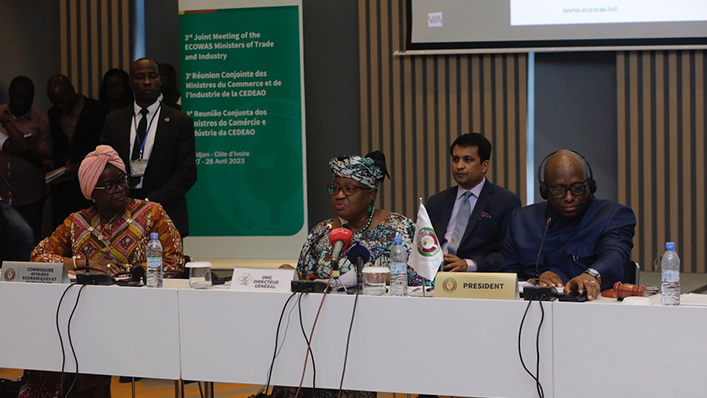
Dr Abas Jalo, Minister of Trade and Industry of Guinea Bissau and Chair of the meeting, stressed the need for ECOWAS member countries and the WTO to focus on implementing the outcomes of the 12th Ministerial Conference (MC12) and to engage in a dialogue on how African member countries can best contribute to the success of the 13th Ministerial Conference (MC13) to be held in Abu Dhabi in February 2024.
The Director-General highlighted the potential for West Africa to benefit from reglobalization and the diversification of global supply chains. The war in Ukraine and the COVID-19 pandemic have highlighted risks linked to excessive concentration in global supply networks. This could provide opportunities for supply chain investment in West Africa, she added.
Dr Okonjo-Iweala urged African countries to tap into the rapid global growth in digitally delivered services. Between 2005 and 2022, world exports of these services grew by an average of 8.1% each year, compared to 5.6% for goods. She called for West African countries to lower their trade costs, which are among the world’s highest, by implementing existing WTO agreements, such as the Trade Facilitation Agreement, and supporting new rules on investment facilitation and e-commerce.
Regarding the outcomes of MC12, the Director-General urged ECOWAS ministers to deposit their instruments of acceptance of the Agreement on Fisheries Subsidies. Seychelles was the first African country to deposit its instrument of acceptance in March 2023. The Agreement establishes a dedicated funding mechanism to support developing and least-developed country members, with assistance available to members once they deposit their instrument of acceptance.
Massandjé Toure-Liste, ECOWAS Commissioner of Economic Affairs and Agriculture, called on the WTO to continue to promote strategies to address issues of food insecurity, fisheries subsidies, and strengthening West African countries’ integration into global supply chains. She noted in particular that the WTO Agreement on Fisheries Subsidies is an important step towards curbing harmful subsidies and protecting global fish stocks.
Ahead of the ministerial roundtable, the WTO organized a two-day workshop with ECOWAS officials to help them gain a detailed understanding of the Fisheries Subsidies Agreement and to facilitate a discussion among participating members on the steps needed for the Agreement to enter into force, its implementation and the second wave of negotiations on fisheries subsidies.
Share
Reach us to explore global export and import deals